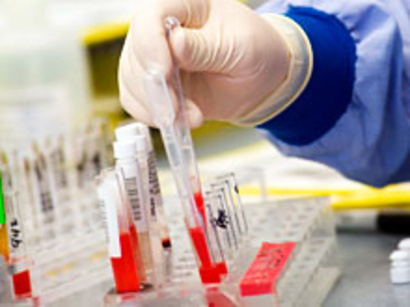UN head criticized over Iran medicine ban

By Sara Rajabova
Head of Iran Medical Council criticized the United Nations Secretary General Ban Ki-moon on Tuesday for his silence over the US-led ban on medicine sales to the Islamic Republic, Press TV channel reported.
In a letter to Ban, Shahaboddin Sadr described as "inhuman" the ban by Western and European countries on sales of medications and medical equipment to Iran.
"It the ban reveals the countenance of tyrants ... and confirms the point that Iran's peaceful nuclear energy program is just a pretext for inhuman plunder of an onslaught against the Iranian people and the Islamic Revolution," he added.
In his letter, Sadr reportedly asked the UN chief on the basis of which law and which moral, religious and human criterion are "the evil powers and arrogant countries imposing embargoes" on the supply of medications and primary healthcare requirements of a nation's children, women and men while the UN remains silent.
Iranian health authorities say recent illegal unilateral sanctions, led by the U.S. and the EU, have made it impossible to obtain medications needed for some diseases.
A transplant surgeon recently informed that the US-engineered sanctions against the Islamic Republic have caused a shortage of medicines in Iran, endangering the lives of many patients.
Millions of patients, suffering from diseases such as diabetes, kidney failure, hemophilia, multiple sclerosis, thalassemia, and leukemia, are said to be affected by the sanctions.
Earlier, Fatemeh Hashemi, head of the Charity Foundation for Special Diseases, a nongovernmental organization supporting 6 million patients in Iran, was widely quoted in the Iranian and European news media as saying that the sanctions have made it difficult to find medicines for such diseases as hemophilia, cancer and multiple sclerosis.
Hashemi also wrote to the UN secretary-general asking him to intervene on behalf of Iranian patients who were having their "basic human rights" taken away by the sanctions.
Ban said in a subsequent UN report that sanctions were, in fact, taking a toll on humanitarian operations in the country. He said even companies that have obtained the requisite license to import food and medicine are facing difficulties in finding third-country banks to process the transactions.
Iranian media reports indicated that medicine prices are rising and some types of medicine are rare due to the sanctions.
Mohammad-Hossein Hariri, an Iranian pharmacist, said in October that Iran's domestically produced drugs were being supplied to the market with a 15-20 per cent average price rise.
He was quoted as saying that some food supplements which are being imported are supplied to the market with a 20-80 per cent price hike.
The Khabar Online website also reported in October that production fell and the import of drugs entered an "alarming phase", threatening special disease patients in particular. The country is facing a shortage of 15 drugs for special disease patients, according to the report. The website quoted the head of the Iranian Thalassemia Society as saying that the drug deficit has led to the death of some patients.
Mehr news agency has reported that Iranian medical labs are experiencing a critical lack of necessary equipment due to an unstable foreign currency rate in the country.
Vice President of Iranian Association of Laboratory Sciences Majid Musallayi said the cost of necessary supplies and lab equipment is unacceptable and is currently at an alarming level.
"Volatility at the foreign exchange markets makes it harder to import the lab equipment," Musallayi said.
The Iranian rial has plummeted in value against the dollar over the past year, with the slide accelerating over the past month.
Musallayi noted that whereas before companies signed contracts with labs for importing equipment and got paid monthly, now companies require to be paid in cash at once.
According to Musallayi, if the problems with equipment imports and insurance payments continue, the situation will get worse.
Referring to the 30 per cent increase in tariffs enacted by the High Council of Lab Medicine, Musallayi said the raised percentage does not meet the costs, adding that tariffs should be increased anywhere from 50 to 240 per cent for costs to be met.
In the meantime, the head of the Iranian parliament's health committee, Hossein Ali Shahriari, said Monday that the Central Bank of Iran has allocated 500 million euros for medicine imports, the IRNA news agency reported.
"But the process of receiving the money and buying the medicines will take a lot of time and this causes a lot of difficulties for the patients," Shahriari added.
"In order to meet the Iranian patients' needs for medicine, some $2.5 billion should be allocated by the end of the current Iranian calendar year (March 20, 2013)," he said.
The Obama administration has quietly eased restrictions on the sale of medicine to Iran amid signs that concern over the suffering of ordinary citizens could complicate an international campaign to punish Iran for its disputed nuclear program, LA Times reported.
Last month, the Treasury Department changed the rules to provide what amounts to a "standing authorization" for sales of certain foods and medicines to ease the paperwork burden, a spokesman for the department's Office of Foreign Asset Control said.
The U.S. and EU-engineered sanctions were imposed based on the accusation that Iran is pursuing non-civilian objectives in its nuclear energy program.
Iran rejects the allegations, arguing that as a committed signatory to the Non-Proliferation Treaty and a member of International Atomic Energy Agency (IAEA), it has the right to use nuclear technology for peaceful purposes.
Here we are to serve you with news right now. It does not cost much, but worth your attention.
Choose to support open, independent, quality journalism and subscribe on a monthly basis.
By subscribing to our online newspaper, you can have full digital access to all news, analysis, and much more.
You can also follow AzerNEWS on Twitter @AzerNewsAz or Facebook @AzerNewsNewspaper
Thank you!
